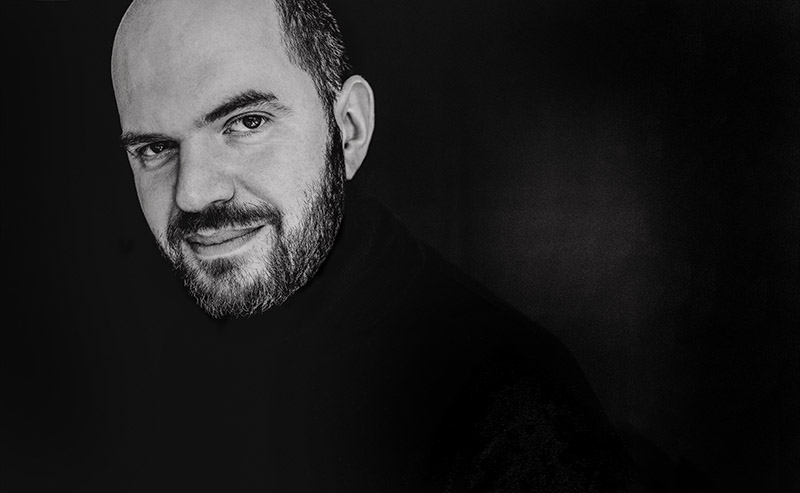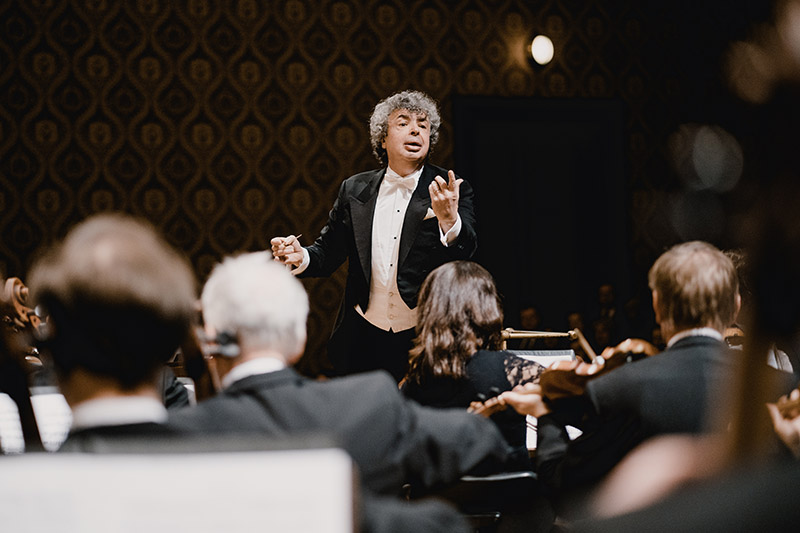This week, Semyon Bychkov leads the Czech Philharmonic in another programme streamed live from the Rudolfinum in Prague. This concert features Schumann’s Piano Concerto in A minor, with soloist Kirill Gerstein, and Tchaikovsky’s Symphony No 2 – known as the ‘Little Russian’.
The heritage of multi award-winning pianist Kirill Gerstein embraces Russian, American and Central European traditions, and his similarly international career includes appearances in solo and concert engagements across Europe and the United States, as well as in China and Australia. His wide-ranging repertoire features compositions from Bach through to the contemporary composer Thomas Adès with whom Gerstein has collaborated for the past decade. Adès wrote a Concerto for Piano and Orchestra for Gerstein – premièred by the Boston Symphony Orchestra – a concerto which Gerstein will also première this season in Vienna, Seoul, Hamburg and Chicago.
Gerstein has worked with Semyon Bychkov since 2007, and it was with Bychkov that he made his debut appearances with the Berlin and Vienna philharmonic orchestras, and with the Royal Concertgebouw Orchestra. As part of Bychkov’s Tchaikovsky Project – a box-set of all of the composer’s symphonies, the three piano concertos, the Romeo & Juliet Fantasy Overture, Serenade for Strings and Francesca da Rimini – Gerstein recorded Tchaikovsky’s three piano concertos live in Prague with the Czech Philharmonic. He will join Bychkov again at the start of the 2021-22 season when they appear with the Royal Concertgebouw Orchestra, performing Shostakovich’s First Piano Concerto.
Robert Schumann made a few abortive attempts at writing a piano concerto between 1829 and 1839, but none of them was completed. In May 1841, however, he made a start on a one-movement, standalone piece – Concert Phantasie (as he spelled it) for Piano and Orchestra. This piece was performed on 13th August, 1841, in a private run-through, with Clara Schumann as soloist, and the Leipzig Gewandhaus Orchestra, conducted by Felix Mendelssohn. Schumann’s attempts to publish it were not, however, successful.
In the summer of 1845, he revisited the Concert Phantasie, and started revising it as the first movement of a full-scale concerto. By the end of the year, he’d completed the full three-movement work, and it premiered in Dresden on 4th December, 1845, with Clara Schumann again as soloist, under the baton of Ferdinand Hiller, to whom the work was dedicated. The Piano Concerto was not regarded as a virtuoso work, but what was interesting about it was the way in which the piano and orchestra interacted, rather than ‘taking turns’ as was standard at the time. Schumann’s Piano Concerto in A minor, Op 54, became one of the composer’s most popular pieces.
Tchaikovsky wrote and orchestrated his Second Symphony between June and November 1872, and it was performed for the first time, in Moscow, by the Russian Musical Society, conducted by Nikolay Rubinstein, in early 1873. Tchaikovsky loved the work and was very proud of it, and although it was extremely well received, he made minor alterations to the symphony soon after its first performance, and further and extensive revisions in December 1879 and January 1880. The work is popularly known as the ‘Little Russian’ Symphony, a name thought to have been given it by the critic Nikolay Kashkin because it features several folk-tunes from the Ukraine region, at that time known as ‘Little Russia’. The final version of the symphony was performed, to great acclaim, by the Russian Musical Society conducted by Eduard Nápravnik in St Petersburg in early 1881, as it was in Moscow at the end of that year, when the ensemble was led by Karl Zike.
Semyon Bychkov leads the Czech Philharmonic and soloist Kirill Gerstein in a programme featuring Schumann’s Piano Concerto in A minor Op 54 and Tchaikovsky’s Symphony No 2, in a live stream from Prague on Thursday, 29th April, at 8.15 pm (CEST). The concert will be transmitted on the Czech Philharmonic’s Facebook page, and on YouTube, and will be available on demand for 7 days. Further information can be found on the Czech Philharmonic website.
Information sourced from:
Czech Philharmonic programme notes


